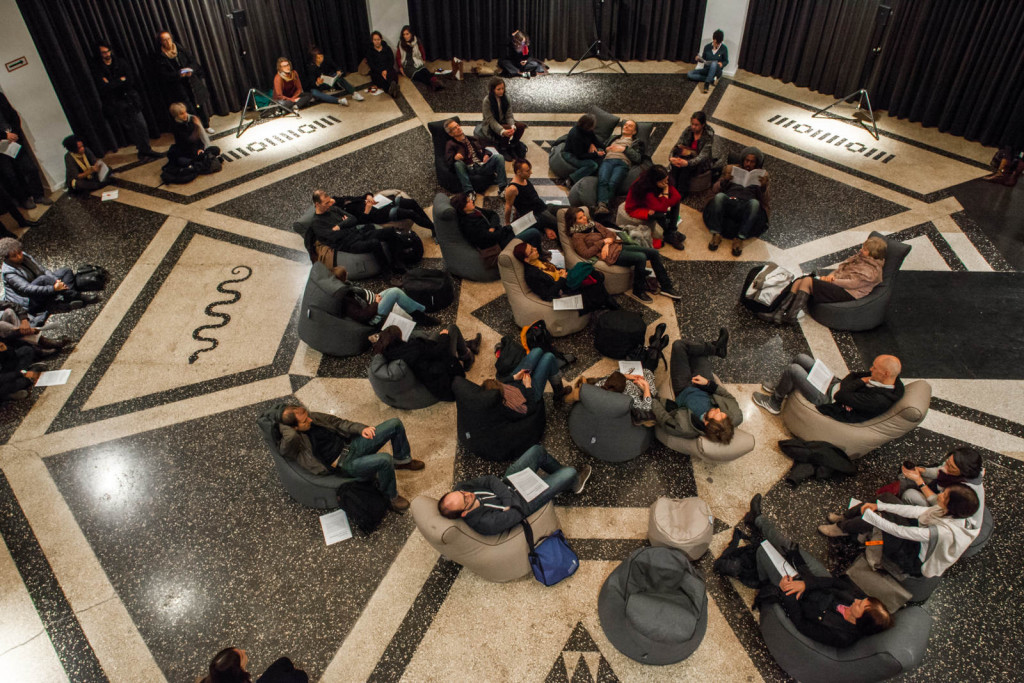Your sound installation translates newspaper articles on refugees and migration from German into the languages of the protagonists. A collage of polyphony. What inspired you?
I found the task of reassessing the topics of flight and migration in 2016 exciting, but also very complicated. They were so pervasive that I didn’t want to contribute yet more personal stories. At some point, I came up with the idea of evaluating existing newspaper articles by compiling them into monologues, freely using them in translations and, thus, in a way, musically as well. Occasionally, I’ve cursed myself for starting such a gigantic project – working on twelve channels, in seven languages and with fourteen speakers. Ultimately, though, it was the right way to reread the portrayal of refugees. Due to the collage structure there was no danger of intervening too much in personal stories or highlighting individual protagonists.
Your piece also plays with translation. What connects you to the topic?
In my radio work, I usually have to transfer every sound on tape into German. I found it interesting to turn the process around and hear the texts in the languages of the countries of origin. I’m also interested in misunderstandings and inaccuracies between languages. Some of which I only became aware of while working on Recording in Progress! when the translators and speakers commented on the language and content of media portrayals from their perspectives.
Do you also mean misunderstandings in reporting in general? Is your work also a kind of criticism of the media?
Criticism wasn’t the focus for me; the selection of texts was too unsystematic for that. But I did notice a certain imbalance. Above all, of course, that Syrians appeared by far the most frequently in portraits and reports and that they almost exclusively were very well educated protagonists. I could hardly find longer stories about people from educationally disadvantaged backgrounds. It often sounded as if they were trying to portray refugees in a way that conveyed to readers: they’re all like us, they can stay. It was far more ambivalent with the Afghans. And again, very different with Kosovo Albanians: Reports on them were mostly about safe third countries and returnees, often told from the perspectives of people who were already back in Kosovo.
In the audio guide documenting the conversations with translators and speakers, they themselves convey very distinct opinions about certain portrayals and translations. To what extent did they influence the project?
Decisively, I would say. I’d already had conversations with some of them during the translations, which can now be heard in the audio guide. They were directly involved in clarifying terminology and content. And there were several discussions with the speakers in the recording studio; for example, I learned that in Eritrea, nobody speaks about civil war, but calls it a war of liberation in the country. Also that Poles would never call themselves Eastern Europeans and that the word Feierabend (quitting time, but literally “evening of celebration”) sounds irritating to many. In one text, a Spaniard living in Germany wonders why there’s constant cause for celebration after the end of the working day, so that word was integrated into the radio play. I also learned a lot about words created only in the past two years. That, for example, the word Heim (home) is adapted in various languages, or that in Tigrinya, congra is a recent slang word for a residence permit derived from the English word congrats. Many Arabs have also been using the new word bilm for rubber dinghies for a while now – but even the Arabic translator didn’t know where it actually came from.
How did you choose certain topics and countries of origin from the bulk of so many narratives?
We worked with seven languages and ten monologues: Albanian for Kosovo and Albania; Arabic for Iraq and Syria; Dari for Afghanistan; Spanish, Polish; Tigrinya for Eritrea plus German. The selection came from immigration statistics for 2015. I deliberately chose texts from that year because it was before the incident of New Year’s Eve, 2015 in Cologne, when the media represented refugees significantly differently from the way they tend to do today. I looked at statistics for the largest groups that apply for asylum in Germany as well as for EU immigration and selected from that. I was also interested in the cases of unclear origin, which are among the ten largest groups of asylum seekers. It’s often about deception in those cases, which in turn has a lot to do with language. For example, when hearings are about finding out where someone is from.
In your radio play, there are also some things that are deliberately incomprehensible, like a few sentences from the German constitution. Why?
That was initially a formal approach. We found a very patient speaker who spoke parts of the constitution backwards, and then I played the recording forward. I was familiar with the method from a different context and found it exciting. But most of all, for our project the idea to reverse the constitution – a very significant text in Germany – seemed appropriate. After all, lately time and again people are invoking “our” values and thus the constitution. They want people from all over the world to adapt, but they’re still playing poker with the basic right to asylum.
Translation: Faith Ann Gibson
